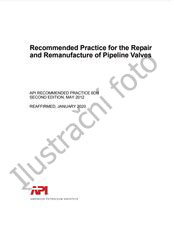Potřebujeme váš souhlas k využití jednotlivých dat, aby se vám mimo jiné mohly ukazovat informace týkající se vašich zájmů. Souhlas udělíte kliknutím na tlačítko „OK“.

API BULL E4-ed.2
ENVIRONMENTAL GUIDANCE DOCUMENT: RELEASE RPT FOR THE OIL & GAS EXPLORATION& PRODUCTION INDUSTRY AS REQUIRED BY THE CLEAN WATER ACT,THE COMPREHENSIVE ENVIRONMENTAL RESPONSE,COMPENSATION & LIABILACT,AND THE EMERGENCY PLANNING& COMMUNITY RIGHT-TO-KNOW ACT
Přeložit název
NORMA vydána dne 1.5.2003
Informace o normě:
Označení normy: API BULL E4-ed.2
Datum vydání normy: 1.5.2003
Kód zboží: NS-1139445
Počet stran: 108
Přibližná hmotnost: 355 g (0.78 liber)
Země: Americká technická norma
Kategorie: Technické normy API
Anotace textu normy API BULL E4-ed.2 :
API BULL E4, 2nd Edition, May 2003 - ENVIRONMENTAL GUIDANCE DOCUMENT: RELEASE RPT FOR THE OIL & GAS EXPLORATION & PRODUCTION INDUSTRY AS REQUIRED BY THE CLEAN WATER ACT,THE COMPREHENSIVE ENVIRONMENTAL RESPONSE,COMPENSATION & LIABILACT,AND THE EMERGENCY PLANNING & COMMUNITY RIGHT-TO-KNOW ACT
This document has been developed to provide the oil and gas production industry guidance on reporting releases of hazardous substances and petroleum to water as required by the Clean Water Act (CWA) and reporting releases of hazardous substances into the environment as required by the Comprehensive Environmental Response, Compensation, and Liability Act (CERCLA) and the Emergency Planning and Community Right-to-Know Act (EPCRA). This document only covers federal requirements for release reporting under the CWA, CERCLA and EPCRA. There are other federal, state, and local laws with spill or release reporting requirements. It is important to understand that compliance with federal reporting requirements does not necessarily satisfy state or local reporting requirements and vice versa.
The document covers the reporting of what most in the industry consider "emergency" releases, which are unplanned and typically are not covered under a permit issued by a government agency. These releases may be to the air, to the ground (and potentially groundwater), to a storm water drainage system, to a waste water system which discharges into a publicly owned treatment works, to traditionally navigable waters or to any other body of water. This document addresses permit exceedances only to the extent that the exceedances are in excess of an established reportable quantity. Releases exceeding permit stipulations, but not meeting an established reportable quantity, may be reportable under other state and federal regulations outside the scope of the CWA, CERCLA and EPCRA.
In preparing the document, API recognized the complexity of the reporting requirements and chose a format to help the user through the various steps associated with deciding what and when to report. The heart of the document is Section 3, which consists of several flowcharts that address the numerous exemptions and requirements of the regulations. The flowcharts were developed with the understanding that the user would have some basic knowledge of the various reporting requirements.
The flowcharts are supported by text (Sections 4, 5, and 6) designed to provide the user with additional insight into the specific questions addressed in the flowcharts. For example, the EPCRA section 302 flowchart asks, "Does the facility have an extremely hazardous substance on site?" The text of the document provides specific guidance on 1) what is considered a facility and 2) what chemicals are considered to be extremely hazardous substances.
Section 7 consists of 17 examples of potentially reportable releases that can occur in oil and gas production operations and shows the user of the document how the flowcharts and text are applied to determine whether an event is reportable.
A list of common oilfield chemicals that may trigger release reporting requirements is included as Appendix A.
The document is not meant to be a substitute for legal advice provided by an attorney. Individuals and organizations using this guidance document are cautioned that requirements of federal, state, and local regulations are constantly evolving and should be reviewed periodically to assure that a companys practices are consistent with current law and regulations.
This publication is under the jurisdiction of the API Upstream Executive Committee on Environmental Conservation. API has made every effort to assure the accuracy and reliability of the information contained in this document. API, however, makes no representation, warranty, or guarantee in connection with this document and hereby expressly disclaims any liability or responsibility for loss or damage resulting from its use, including loss or damage arising from the violation of any federal, state, or local regulation with which this guidance may conflict.
NOTE ON REFERENCES: All references to the Code of Federal Regulations in this document are to the edition revised as of July 1, 2002, unless otherwise noted, as updated by Federal Register notices as of the date of publication of this Bulletin. References to the statutes are to the versions in effect as of the date of publication. Daily Federal Register notices and the Code of Federal Regulations are available online from the Government Printing Office website and the Environmental Protection Agency website.
API publications may be used by anyone desiring to do so. Every effort has been made by the Institute to assure the accuracy and reliability of the data contained in them; however, the Institute makes no representation, warranty, or guarantee in connection with this publication and hereby expressly disclaims any liability or responsibility for loss or damage resulting from its use or for the violation of any federal, state, or municipal regulation with which this publication may conflict.
Suggested revisions are invited and should be submitted to the standardization manager, American Petroleum Institute, 1220 L Street, N.W., Washington, D.C. 20005.
Doporučujeme:
Aktualizace technických norem
Chcete mít jistotu, že používáte pouze platné technické normy?
Nabízíme Vám řešení, které Vám zajistí měsíční přehled o aktuálnosti norem, které používáte.
Chcete vědět více informací? Podívejte se na tuto stránku.



 Cookies
Cookies
